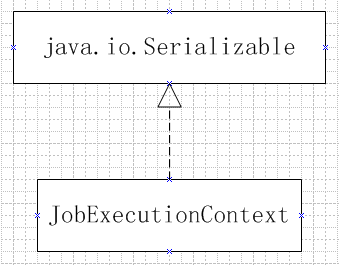
public class JobExecutionContext implements java.io.Serializable {
/*
* ~~~~~~~~~~~~~~~~~~~~~~~~~~~~~~~~~~~~~~~~~~~~~~~~~~~~~~~~~~~~~~~~~~~~~~~~~
* Data members.
* ~~~~~~~~~~~~~~~~~~~~~~~~~~~~~~~~~~~~~~~~~~~~~~~~~~~~~~~~~~~~~~~~~~~~~~~~~
*/
private transient Scheduler scheduler;
private Trigger trigger;
private JobDetail jobDetail;
private JobDataMap jobDataMap;
private transient Job job;
private Calendar calendar;
private boolean recovering = false;
private int numRefires = 0;
private Date fireTime;
private Date scheduledFireTime;
private Date prevFireTime;
private Date nextFireTime;
private long jobRunTime = -1;
private Object result;
private HashMap data = new HashMap();
/*
* ~~~~~~~~~~~~~~~~~~~~~~~~~~~~~~~~~~~~~~~~~~~~~~~~~~~~~~~~~~~~~~~~~~~~~~~~~
* Constructors.
* ~~~~~~~~~~~~~~~~~~~~~~~~~~~~~~~~~~~~~~~~~~~~~~~~~~~~~~~~~~~~~~~~~~~~~~~~~
*/
/**
* Create a JobExcecutionContext with the given context data.
*/
public JobExecutionContext(Scheduler scheduler,
TriggerFiredBundle firedBundle, Job job) {
this.scheduler = scheduler;
this.trigger = firedBundle.getTrigger();
this.calendar = firedBundle.getCalendar();
this.jobDetail = firedBundle.getJobDetail();
this.job = job;
this.recovering = firedBundle.isRecovering();
this.fireTime = firedBundle.getFireTime();
this.scheduledFireTime = firedBundle.getScheduledFireTime();
this.prevFireTime = firedBundle.getPrevFireTime();
this.nextFireTime = firedBundle.getNextFireTime();
this.jobDataMap = new JobDataMap();
this.jobDataMap.putAll(jobDetail.getJobDataMap());
this.jobDataMap.putAll(trigger.getJobDataMap());
this.jobDataMap.setMutable(false);
this.trigger.getJobDataMap().setMutable(false);
}
/*
* ~~~~~~~~~~~~~~~~~~~~~~~~~~~~~~~~~~~~~~~~~~~~~~~~~~~~~~~~~~~~~~~~~~~~~~~~~
* Interface.
* ~~~~~~~~~~~~~~~~~~~~~~~~~~~~~~~~~~~~~~~~~~~~~~~~~~~~~~~~~~~~~~~~~~~~~~~~~
*/
/**
* Get a handle to the <code>Scheduler</code> instance that fired the
* <code>Job</code>.
*/
public Scheduler getScheduler() {
return scheduler;
}
/**
* Get a handle to the <code>Trigger</code> instance that fired the
* <code>Job</code>.
*/
public Trigger getTrigger() {
return trigger;
}
/**
* Get a handle to the <code>Calendar</code> referenced by the <code>Trigger</code>
* instance that fired the <code>Job</code>.
*/
public Calendar getCalendar() {
return calendar;
}
/**
* If the <code>Job</code> is being re-executed because of a 'recovery'
* situation, this method will return <code>true</code>.
*/
public boolean isRecovering() {
return recovering;
}
public void incrementRefireCount() {
numRefires++;
}
public int getRefireCount() {
return numRefires;
}
/**
* Get the convenience <code>JobDataMap</code> of this execution context.
*
* The <code>JobDataMap</code> found on this object serves as a convenience -
* it is a merge of the <code>JobDataMap</code> found on the
* <code>JobDetail</code> and the one found on the <code>Trigger</code>, with
* the value in the latter overriding any same-named values in the former.
* <i>It is thus considered a 'best practice' that the execute code of a Job
* retrieve data from the JobDataMap found on this object</i>
*
* NOTE: Do not
* expect value 'set' into this JobDataMap to somehow be set back onto a
* <code>StatefulJob</code>'s own JobDataMap.
*
* Attempts to change the contents of this map typically result in an
* <code>IllegalStateException</code>.
*
*/
public JobDataMap getMergedJobDataMap() {
return jobDataMap;
}
/**
* Get the <code>JobDetail</code> associated with the <code>Job</code>.
*/
public JobDetail getJobDetail() {
return jobDetail;
}
/**
* Get the instance of the <code>Job</code> that was created for this
* execution.
*
* Note: The Job instance is not available through remote scheduler
* interfaces.
*/
public Job getJobInstance() {
return job;
}
/**
* The actual time the trigger fired. For instance the scheduled time may
* have been 10:00:00 but the actual fire time may have been 10:00:03 if
* the scheduler was too busy.
*
* @return Returns the fireTime.
* @see #getScheduledFireTime()
*/
public Date getFireTime() {
return fireTime;
}
/**
* The scheduled time the trigger fired for. For instance the scheduled
* time may have been 10:00:00 but the actual fire time may have been
* 10:00:03 if the scheduler was too busy.
*
* @return Returns the scheduledFireTime.
* @see #getFireTime()
*/
public Date getScheduledFireTime() {
return scheduledFireTime;
}
public Date getPreviousFireTime() {
return prevFireTime;
}
public Date getNextFireTime() {
return nextFireTime;
}
public String toString() {
return "JobExecutionContext:" + " trigger: '"
+ getTrigger().getFullName() + " job: "
+ getJobDetail().getFullName() + " fireTime: '" + getFireTime()
+ " scheduledFireTime: " + getScheduledFireTime()
+ " previousFireTime: '" + getPreviousFireTime()
+ " nextFireTime: " + getNextFireTime() + " isRecovering: "
+ isRecovering() + " refireCount: " + getRefireCount();
}
/**
* Returns the result (if any) that the <code>Job</code> set before its
* execution completed (the type of object set as the result is entirely up
* to the particular job).
*
* The result itself is meaningless to Quartz, but may be informative
* to <code>{@link JobListener}s</code> or
* <code>{@link TriggerListener}s</code> that are watching the job's
* execution.
*
* @return Returns the result.
*/
public Object getResult() {
return result;
}
/**
* Set the result (if any) of the <code>Job</code>'s execution (the type of
* object set as the result is entirely up to the particular job).
*
* The result itself is meaningless to Quartz, but may be informative
* to <code>{@link JobListener}s</code> or
* <code>{@link TriggerListener}s</code> that are watching the job's
* execution.
*
* @return Returns the result.
*/
public void setResult(Object result) {
this.result = result;
}
/**
* The amount of time the job ran for (in milliseconds). The returned
* value will be -1 until the job has actually completed (or thrown an
* exception), and is therefore generally only useful to
* <code>JobListener</code>s and <code>TriggerListener</code>s.
*
* @return Returns the jobRunTime.
*/
public long getJobRunTime() {
return jobRunTime;
}
/**
* @param jobRunTime The jobRunTime to set.
*/
public void setJobRunTime(long jobRunTime) {
this.jobRunTime = jobRunTime;
}
/**
* Put the specified value into the context's data map with the given key.
* Possibly useful for sharing data between listeners and jobs.
*
* NOTE: this data is volatile - it is lost after the job execution
* completes, and all TriggerListeners and JobListeners have been
* notified.
*
* @param key
* @param value
*/
public void put(Object key, Object value) {
data.put(key, value);
}
/**
* Get the value with the given key from the context's data map.
*
* @param key
*/
public Object get(Object key) {
return data.get(key);
}
}
3. 常用方法
<1> public Scheduler getScheduler()






















 367
367

 被折叠的 条评论
为什么被折叠?
被折叠的 条评论
为什么被折叠?








